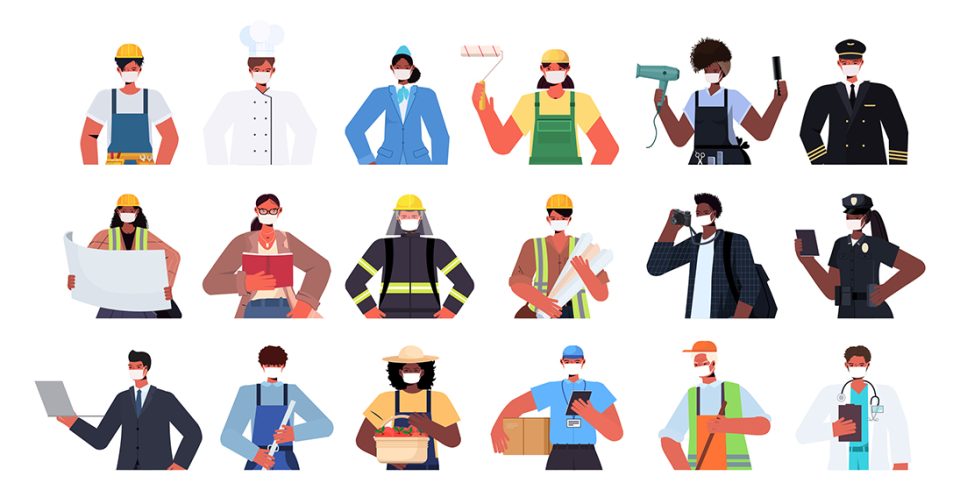Editor’s note: This piece originally ran on August 28, 2014.
When I was in my last parish, I became very involved in efforts to bring jobs to a large part of the community. We strived to serve people who were unemployed. Work is essential for the well-being of a community and for the well-being of families and, more importantly, work contributes to the dignity of people.
Labor Day is about celebrating work and celebrating workers. The day is observed the first Monday in September. It was established by U.S. President Grover Cleveland in 1887.
When I think about Labor Day, the word “honor” comes to mind. This is a time to honor the American worker—the ordinary, everyday, hardworking men and women in every occupation, because these are the folks who are the backbone of our nation and the engine of our economy.
We pause to honor and give thanks for the small and the large things they devote their daily work to, those things that make our lives easier and that we often take for granted. I am aware that these are difficult times for a lot of workers, as plants close and move to other places, taking jobs with them and putting families at risk. So, not only must we honor the worker, we must work to make sure that jobs are protected, that workers are trained with new skills as new technologies emerge, and that there is a push for a wage that is a livable and sustainable.
As I write this I think of the many women and men, who we do not see, who help to make our economy run. They do not have a public face. They are the maintenance staff in hospitals who keep the floors clean; those in housekeeping who wash the linen and change it; the drivers who get the produce that we purchase from the farms to the supermarkets; the farmers who work from sun up to sunset to till the soil, plant the seeds, water and tend the fields to grow the produce that will make it to our tables where we will eat and enjoy. I think of the waitresses and the waiters who serve us in our favorite eateries and who only make $2.33 an hour plus tips. I have become acutely aware of these workers in recent months, because my wife and I eat at least one meal a day at a local restaurant.
On Labor Day, we remember all of those who are actively working. But equally, we remember those who have recently lost jobs and those who have been without work for a while.
I see how hard most of these individuals work. They are on their feet for eight hours, sometimes longer to make sure that what we order is right, served in a timely manner and that we are comfortable. The majority of them do it with a smile. My wife and I consistently leave a 15 percent gratuity. In large measure, because we recognize how tough the work of a server is, the gratuity is a way to honor their work.
At the end of this past June, I helped our youngest son drive out to Northern California, where he would be living and working. His apartment wouldn’t be ready for a few days, so we stayed in a hotel for a week. I noticed the housekeeping staff right away, as they started their work each day at 8 a.m. There was a crew that came into the rooms to strip the linen and vacuum. They would open the windows to let in fresh air. Then a woman would come behind that team and put fresh linen on the beds and make them, dust and actually clean the bath tub, sink and toilet, leaving fresh towels and stocking the counter with toiletries.
On the last day of my stay, as I came down the hall toward my room, this woman, who was Latina, was finishing up my room. I stood and watched her complete the finishing touches. Before she left the room she checked everything meticulously. When I walked into the room I thanked her and then placed $25 dollars in her hands. Her smile said everything. She was appreciative.
I had no idea what her wage was nor did I ask, but I wanted her to know with that small token that I took notice of her work. I wanted her to know that I honored her as a person, and I honored the pride and the care that she took in making sure that the guests who stayed at that hotel were served well.
There is a national debate taking place about raising the minimum wage to $10.15 an hour. Some communities are moving to increase the amount even higher. I think the discussion is a worthy one. Again, a higher wage is not just an incentive to ensure that we get good workers and keep them, but higher-wage jobs become the best vehicle for moving people out of poverty.
A strong labor force is the best strategy for ensuring domestic tranquility. On Labor Day, we remember all of those who are actively working. Thank you for your faithfulness. But equally, we remember those who have recently lost jobs and those who have been without work for a while. The best way to honor them is to commit to helping them find work. Work that is meaningful and that helps people lift their heads and their hearts in dignity and self-respect—and ultimately helps rebuild lives and restore communities.





